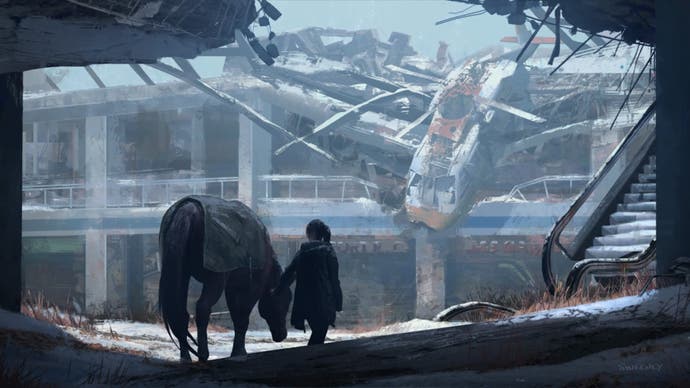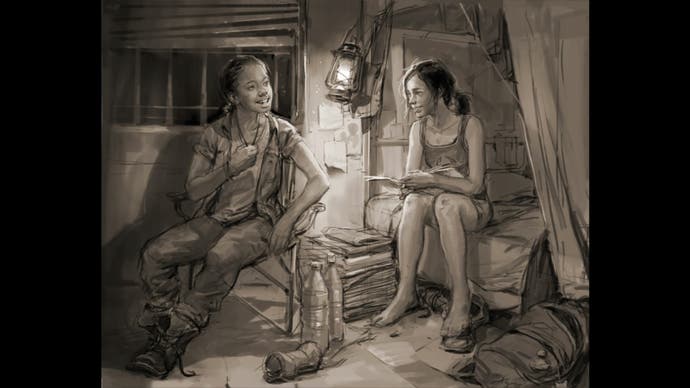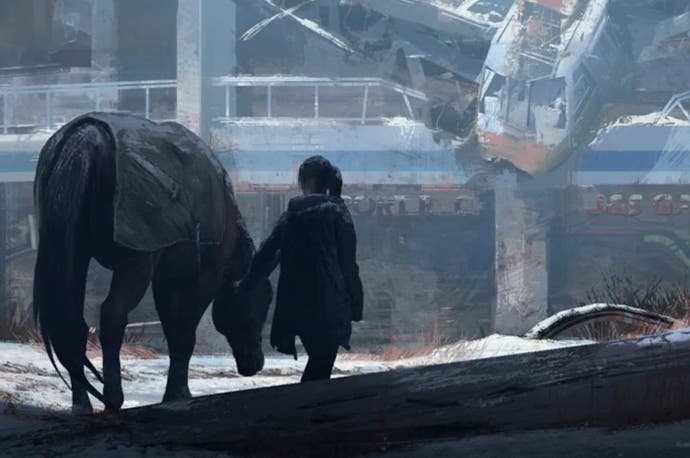Games of 2014: The Last of Us: Left Behind
The long kiss goodnight.
BEWARE OF THE SPOILER! (It's right there at the very top of the article, so should you not want one of Left Behind's key story beats spoiled for you run, run you fool, and don't look back.)
Despite the myriad moments that build to it playing out the way that it does, I'm slightly abashed to say that I wasn't expecting the kiss. I don't know why. It's plain to see that Ellie and Riley's feelings for one another run deeper than platonic friendship and despite neither being able to give voice to it, they know it, too. Instead, it manifests through instances of subtle physical contact, heated accusations and some slightly awkward exchanges. Revisiting Left Behind after several months, it's endearing to watch the pair talk around their feelings, coaching them in light-hearted teenage banter and friendly digs as they reacquaint themselves after a lengthy absence; it reminds me why Left Behind is one of my favourite video game stories of 2014.
Amongst its many touching moments is the imaginary bout on the broken arcade cabinet. This gift from Riley to Ellie not only lends weight to events in the main game but also leaves Ellie exasperated at her friend's inability to acknowledge why they're really there. It's a date, of course, the two girls unwittingly echoing a teenage ritual from another age despite living in a world in which a trip to the mall is a fanciful quirk of an unfamiliar past; the superficiality that the complex represents long since left behind.

Despite all of this, I still wasn't expecting that kiss. Maybe it's something to do with Left Behind being the product of a prominent, mainstream studio and my resigned reticence to believe that they would be so bold as to go there. Maybe it was just my own blindness, after all had Riley been a boy I'd have been expecting it from the off.
It's this ability to defy expectation in telling a story to which we already know the end that makes Left Behind so poignant. But it's the manner in which Naughty Dog threads the two strands of its story together and how it links them to that of The Last of Us that really makes it shine. The flashback sequences to the Boston quarantine zone feature exploration of a world as familiar to us as it is alien to the teenage friends. Clowning around in fancy dress, indulging in friendly rivalry, telling jokes and pulling goofy photo poses are things to which our younger selves can relate, while the water gun fight stands as perfect a throwback to childhood as Naughty Dog could have depicted.
The distinct lack of combat in the Boston portion of the story has the knock-on effect of changing the dynamic of the game by removing the need to scavenge for supplies and ammo. Nonetheless, our gamer instinct still has us opening every cupboard and searching every nook and cranny and so being rewarded with incidental dialogue, collectibles and a clutch of Easter Eggs that reveal still more about the post-pandemic world. It's a bold move by Naughty Dog and while the risk is arguably lessened by featuring combat in the other portion of the game, Riley and Ellie's jaunt serves as a quiet counterpoint to the louder moments that take place in the Colorado mall.

In the few instances of necessary violence as Ellie struggles to find supplies to help fix a broken Joel, Left Behind hints at an emergent system missing from main game. By populating some of its spaces with both hunters and infected, you're encouraged to play catalyst with a well-placed bottle or brick, bringing together the two groups for bloody confrontation. Naughty Dog wisely refrains from introducing new weapons and dials back the plethora of armaments that turn Joel into a one-man army. Played on Survivor or Grounded difficulty, Left Behind excels at forcing you to make the most of your inventory in a way that was never necessary in The Last of Us, and its feature-film runtime ensures none of its tricks have time to get old or stale.
The same can be said of Gustavo Santaolalla's excellent score, which is once more wonderfully threaded throughout; his music providing the heartbeat to which the narrative beats. It's hard to overstate how important Santaolalla's work is to the emotional impact of both The Last of Us and Left Behind, and it's clear that Naughty Dog knows that, too (Neil Druckmann once revealed that the dialogue from a pivotal scene in the main game was dropped in favour of allowing the score to convey the emotional weight of the interaction).
Fleeting as it may be, Left Behind is a tightly scripted, brilliantly edited experience. It's portrayal of a blossoming romance between two teenage girls is beautifully realised and deftly crafted, so that by the time we get to that kiss we feel like we've earned it rather than it being too cheaply given. It's a wonderful thing to be surprised by a video game and, in a few quiet and important ways, that in itself stands as testament to both Naughty Dog's artistry and Left Behind's role as a standard bearer.

